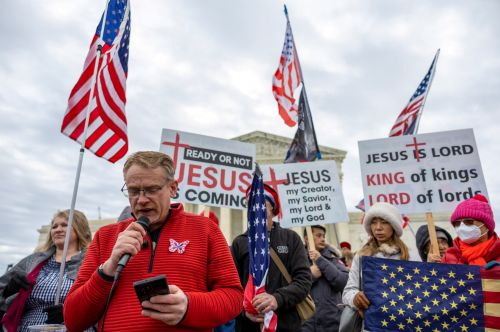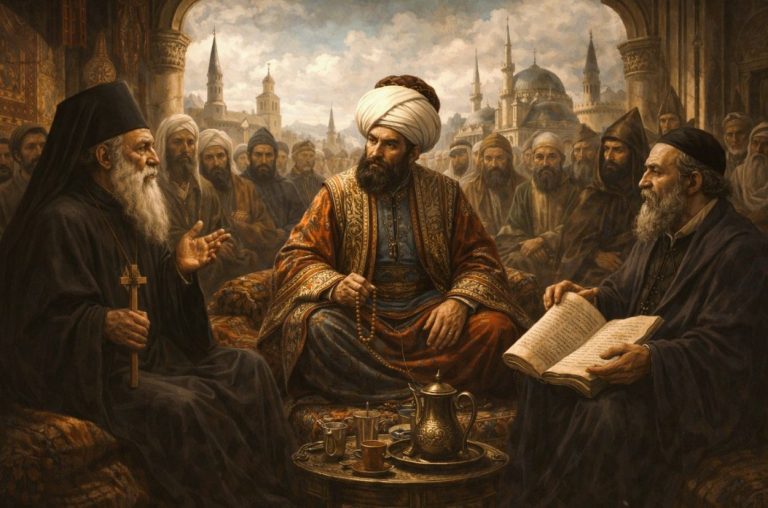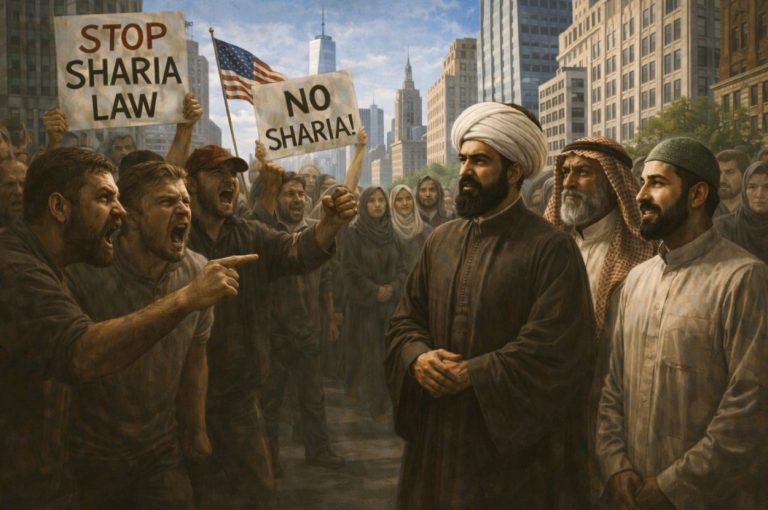

Reasserting secular freedom does not mean silencing believers. On the contrary, it means ensuring that belief remains authentic, uncoerced by law or policy.

By Matthew A. McIntosh
Public Historian
Brewminate
Introduction: Faith by Force, Not Choice
The United States has long celebrated itself as a nation built on religious freedom, but that promise has never been evenly applied. From the Puritans who saw their colonies as “a city upon a hill” to modern political leaders who insist America is a “Christian nation,” one faith has always held a privileged seat at the table. Today, that privilege has hardened into outright imposition. The Republican Party, proudly rebranded by its leaders as “God’s Own Party,” wields Christianity not simply as a personal creed but as a governing tool.
This is not about what people believe in private. Worship the rock in your backyard if it gives you peace. Believe in any deity or none at all. That freedom is sacred. What is at stake is when one religion’s doctrines are written into law and enforced as policy over all Americans, believers and non-believers alike. The Supreme Court’s decision to overturn Roe v. Wade was celebrated by Christian conservatives as a biblical victory, even as it stripped millions of their rights. State legislatures in Republican strongholds have banned abortion, restricted LGBTQ rights, and even targeted school curricula, all justified as defending “Christian values.”
This is not a contest between religions, despite the GOP’s frequent “what about” appeals to Islam or other minority faiths. Christianity is the dominant religion in the United States, and it is precisely because of its dominance (its cultural saturation, its historical embedding in law and language, its hold on political identity) that it poses the greatest threat to true pluralism. Freedom of religion was never meant to mean rule by one religion.
Historical Roots of Christian Privilege in America
The tension between America’s promise of religious liberty and its practice of Christian favoritism is as old as the Republic itself. The Constitution’s First Amendment prohibits any establishment of religion, yet Christianity was so deeply woven into the cultural fabric that the prohibition often rang hollow in practice. Early leaders invoked biblical imagery to justify expansion, conquest, and governance, a legacy of the Puritan belief that the New World was destined to be a Christian commonwealth. The language of Manifest Destiny, which sanctified territorial expansion in the nineteenth century, was explicitly rooted in the idea that Americans carried a divine mission.
The embedding of Christian language into civic life only deepened in the modern era. The national motto “In God We Trust” was added to U.S. currency in 1956, during the height of the Cold War, not as a neutral expression of heritage but as a deliberate contrast to “godless communism.” Likewise, the phrase “one nation under God” was inserted into the Pledge of Allegiance in 1954 at the urging of religious leaders and politicians eager to fuse patriotism with Christian identity. These changes were not inevitable traditions but calculated political moves, embedding Christianity in the public square while signaling that true Americanness was synonymous with belief in God.
Beyond mottos and pledges, Christian privilege was also normalized through law and jurisprudence. In the early nineteenth century, Supreme Court justices referred to America as a “Christian nation,” a claim that became entrenched in cases such as Church of the Holy Trinity v. United States (1892), where the Court declared that “this is a Christian nation” while ruling in favor of a church’s right to employ a foreign pastor. Though technically about labor contracts, the sweeping language of the decision echoed across decades, reinforcing the notion that Christianity was not merely one religion among many but the assumed moral framework of the Republic. This judicial imprimatur set a precedent: Christianity could be treated as the cultural default, its rituals and references smuggled into public life under the guise of tradition.
Even the concept of “civil religion” in America, where presidents end speeches with “God bless America” and public ceremonies mix patriotism with Christian prayer, has functioned less as a broad ecumenical gesture than as a reaffirmation of Christian dominance. Scholars like Robert Bellah argued that civil religion binds Americans through shared symbols, but in practice, it has privileged Christian imagery above all others. When every president from Eisenhower onward publicly invoked God as a national patron, and when public schools enforced rituals like the Pledge of Allegiance with its religious amendment, the supposed neutrality of the state blurred into a soft theocracy. These historical layers matter, because they explain how a nation built on the promise of freedom could drift so easily into a politics where one faith dictates policy.
Contemporary Mechanisms of Christian Imposition
Law and the Courts
The courts have become one of the most powerful engines of Christian imposition in public life. In recent years, the Supreme Court has steadily expanded the scope of what it calls “religious liberty,” but that expansion overwhelmingly privileges conservative Christian claims. In Dobbs v. Jackson Women’s Health Organization (2022), the Court overturned Roe v. Wade, ending nearly fifty years of constitutional protection for abortion rights. The decision was hailed by Christian conservatives as the culmination of a decades-long campaign rooted not in secular medical reasoning but in biblical interpretations of life and morality. More recently, in 303 Creative v. Elenis (2023), the Court ruled that a Christian web designer could refuse to provide services to same-sex couples, extending religious exemptions in ways that directly erode civil rights.
This trend reflects a broader judicial philosophy in which Christianity is cast as endangered and therefore entitled to special protections. Yet the danger is not persecution, it is pluralism itself. When the Court defends public funding for religious schools, or permits the display of Christian monuments while rejecting secular or minority religious ones, it is not defending freedom of religion but enforcing hierarchy. Christianity is upheld as the default, while other beliefs, or no belief, are relegated to second-class status.
Policies and Governance
The legislative arena mirrors the courts. Republican-led states have passed laws banning abortion outright, in some cases with no exceptions for rape or incest, justified as defending “Christian values.” In Texas, the 2021 SB 8 law deputized private citizens to enforce abortion restrictions, a vigilante system cheered by evangelical leaders. At the same time, Republican lawmakers have targeted LGBTQ communities with so-called “Don’t Say Gay” laws, drag bans, and restrictions on gender-affirming care for minors, all defended as moral imperatives rooted in biblical teaching rather than medical consensus.
Education has become a particular battlefield. Book bans, such as those sweeping through Florida and Texas, disproportionately target works that include LGBTQ themes, critical race theory, or anything perceived as contradicting conservative Christian doctrine. State officials often frame these as protecting children, but the underlying impulse is clear: to align public education with a singular, sectarian worldview. The push for school vouchers and state funding of private religious education further erodes the separation of church and state, channeling taxpayer dollars to institutions that can openly discriminate under the banner of faith.
Public Symbols and Rituals
Perhaps the most visible, if sometimes overlooked, mechanism of Christian imposition lies in public ritual. Legislative sessions across the country still open with explicitly Christian prayers, even when citizens of other faiths, or none, are present. Public displays of nativity scenes or large crosses are defended in court as expressions of “heritage” rather than religion, while minority faith symbols are dismissed as controversial or inappropriate. The message is unmistakable: Christianity is normal, everything else is other.
Even political rhetoric reinforces this ritual dominance. When candidates speak of restoring America to greatness, they often pair that vision with calls for religious revival, explicitly equating national strength with Christian faith. It is a vision in which citizenship itself is fused with religiosity, where to be fully American is to be Christian, and everyone else must simply tolerate their exclusion.
The GOP as “God’s Own Party”
The Republican Party has not only leaned into Christianity as a cultural backdrop; it has embraced it as its central identity. In the 1980s, the rise of the Moral Majority and figures like Jerry Falwell formalized the bond between the GOP and evangelical Christians, transforming issues like abortion and school prayer into litmus tests for conservative politics. By the 2000s, President George W. Bush described Jesus as his “favorite philosopher” and openly cast the War on Terror in spiritual terms, further cementing the image of Republicans as the political arm of American Christianity. Today, that image has hardened into doctrine: the GOP is “God’s Own Party,” unapologetically fusing faith and governance.
This merger is not accidental but strategic. Republican leaders now routinely frame policy debates as battles between biblical morality and secular corruption. Former House Speaker Newt Gingrich has called America a “Christian nation” under attack by “secular leftists.” Florida Governor Ron DeSantis has described his governing philosophy as being rooted in “biblical values,” a message echoed in Republican state platforms across the South and Midwest. President Donald Trump, despite his personal indifference to religion, has been embraced by Christian nationalists as a chosen instrument, frequently appearing at events where pastors and politicians proclaim him divinely appointed.
The GOP also deploys a calculated form of whataboutism, pointing to the presence of Islam or other faiths in public life to argue that Christianity is under siege. Yet Christianity is the majority faith in the United States, with over 60% of Americans identifying as Christian, a dominance unmatched by any minority religion. When Republican lawmakers object to a Muslim official swearing an oath on the Qur’an, or dismiss secular citizens as unfit for office, they reveal the core contradiction: Christianity is not threatened by pluralism, it is threatened by equality.
What emerges is a party that no longer even pretends to uphold separation of church and state. Instead, Republicans campaign and govern as though faith and citizenship are inseparable, as though the Constitution itself is subordinate to the Bible. The GOP’s identity as “God’s Own Party” is not merely branding. It is an ideology, one that seeks to legislate belief and enshrine Christianity as the nation’s civic religion.
The Cost of Christian Imposition
The imposition of Christianity through law and politics is not a matter of abstract principle. It has tangible, often devastating, consequences for millions of Americans. Nowhere is this clearer than in reproductive rights. After the fall of Roe v. Wade, entire regions of the country became abortion deserts, with women forced to travel hundreds of miles for care or risk criminal charges for seeking medical procedures once considered standard. These bans, justified by appeals to scripture, endanger lives by limiting doctors’ ability to treat ectopic pregnancies or miscarriages. The result is a chilling reminder that when one religion’s morality dictates law, the bodies of those who do not share that faith are collateral damage.
LGBTQ communities face similar harm. Under the banner of “religious freedom,” businesses have won the right to deny services, and states have passed laws restricting healthcare, education, and even public expression. For transgender youth, bans on gender-affirming care strip away medical options endorsed by every major medical association, leaving families desperate and children vulnerable. These policies are defended as protecting Christian values, but they erode civil rights in ways that disproportionately affect those who do not conform to a narrow, sectarian definition of morality.
The cultural costs are equally corrosive. When Christianity is elevated as the national identity, all others are implicitly marginalized. Secular citizens, Muslims, Jews, Hindus, Buddhists, atheists, all are reminded daily that they are tolerated, not embraced. Public schools stripped of inclusive curricula tell minority children that their histories are unworthy. Legislative prayers that invoke Jesus signal that belonging requires conformity. In this climate, citizenship becomes conditional, and democracy itself weakens. A republic built on pluralism cannot endure when one faith claims sovereignty over the rest.
A Call to Reassert Secular Freedom
The United States was never meant to be governed by scripture. Thomas Jefferson wrote of a “wall of separation between church and state,” a metaphor that remains one of the clearest expressions of the nation’s founding principles. That wall has been chipped away for decades, sometimes under the guise of heritage, sometimes under the cover of morality, and now with open defiance. To preserve genuine freedom of religion, it must be rebuilt, not as a barrier against faith itself, but as a safeguard for the pluralism that faith requires.
Reasserting secular freedom does not mean silencing believers. On the contrary, it means ensuring that belief remains authentic, uncoerced by law or policy. Christianity, like any religion, thrives when it is chosen, not mandated. When the state legislates doctrine, it corrupts both faith and democracy. That is why defending secular government is not hostility to religion but protection for it, an affirmation that no American should have to worship at the altar of political Christianity to live freely in their own country.
The path forward demands vigilance. Courts must be pressed to honor the Constitution rather than reinterpret it as biblical commentary. Legislatures must be held accountable when they cloak sectarian policies in the language of tradition. Citizens (whether Christian, Jewish, Muslim, atheist, or anything else) must recognize that freedom of conscience is indivisible. To lose it for one is to endanger it for all. Believe in God, in the rock in your backyard, or in nothing at all. But keep that belief out of the law, out of the schools, and out of the policies that govern people who never chose it. Only then can the promise of liberty, real liberty, be more than words on parchment.
Originally published by Brewminate, 10.03.2025, under the terms of a Creative Commons Attribution-NonCommercial-NoDerivatives 4.0 International license.


